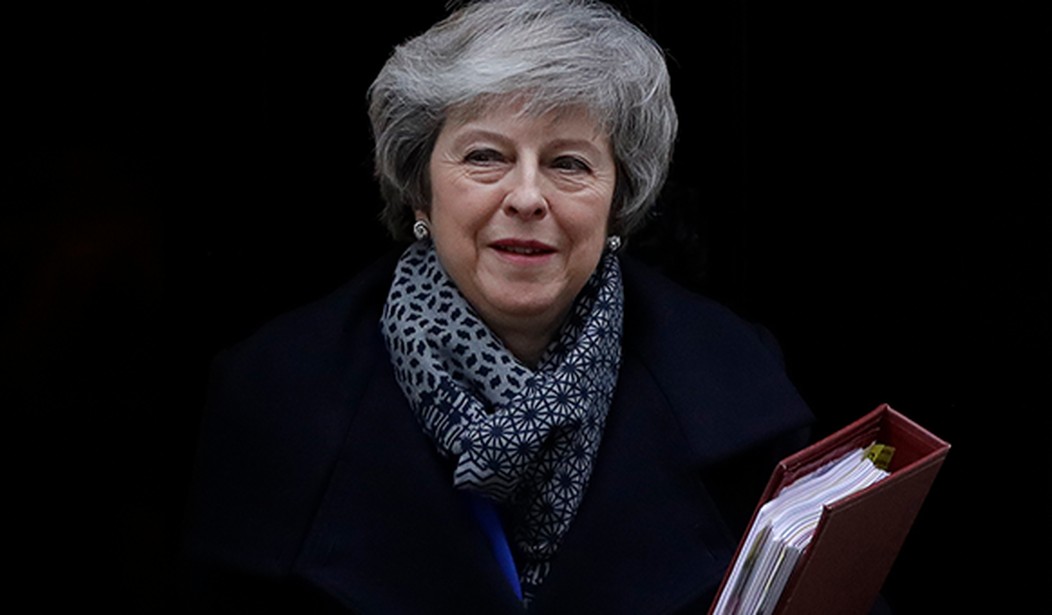In the throes of the Tories’ chaotic Brexit push, Theresa May insisted today that a crash-out is not inevitable, even with her party unable to come to a consensus on any alternative. Parliament took up a series of amendments today that will significantly change the agreement May reached with the EU last year. It will be up to Brussels, the PM stated, to reopen negotiations to account for the will of Parliament — assuming any configuration of these changes gets a majority:
The Prime Minister told MPs she accepts legal changes will have to be made to the agreement.
It represents a significant shift in Mrs May’s position following a historic defeat last month. Eurosceptic Tory MPs are now likely to support a government-backed amendment tabled by Sir Graham Brady, leader of the 1922 committee of backbench MPs.
Mrs May told the Commons: “What I’m talking about is not a further exchange of letters, but a significant and legally binding change to the Withdrawal Agreement. It will involve reopening the Withdrawal Agreement”.
She said today is not the last chance to avoid a no deal Brexit, and that they should focus on sending a “clear message” to Brussels instead.
A Downing Street spokesman said: “Brady sets out a commitment to avoid a hard border and gives scope for a new discussion with the EU about how best to achieve that. In order to win the support of the Commons, legal changes will be required that will mean reopening the Withdrawal Agreement.”
That only works if Parliament actually passes a Brexit bill. Even May isn’t convinced that the Brady amendment package will succeed. She warned the Commons that they have to untie her hands by making a commitment on Brexit if they expect the EU to reopen talks:
“The time has come for words to be matched by deeds,” she said on Tuesday. “If you want to tell Brussels what this House will accept, you have to vote for it. If you want to leave with a deal, you have to vote for it. If you want Brexit, you have to vote for Brexit.”
She added: “The odds of success become far longer if this House ties one hand behind my back. So I call on the House to give me the mandate I need to deliver a deal this House can support. Do that and I can work to reopen the withdrawal agreement.”
Even if it does pass, the EU wants to send an exceedingly clear message back to May. They will not reopen negotiations again, especially to remove the “backstop” required to preserve the Good Friday Agreement and prevent a hard border in Ireland. They’re not terribly interested in proposals to pursue vague “alternative arrangements,” and have gone as far as they can to accommodate the Brits:
Exclusive; The European Union (all 27 countries and the Commission) has already decided to reject the Brady amendment, should it be supported by MPs.
They say they will NOT renegotiate the Brexit deal. pic.twitter.com/egWGzsJmd3— Ian Wishart (@IanWishart) January 29, 2019
The EU’s deputy negotiator characterized today’s efforts in Bill Murray terms:
Confidence in London about being able to change the agreement is met with disbelief in Brussels.
Sabine Weyand, deputy to EU Brexit negotiator Michel Barnier, said: “There’s no negotiation between the EU and the UK. That negotiation is finished.
“It does feel like Groundhog Day.”
France and Ireland rejected any renegotiation out of hand:
A source in French President Emmanuel Macron’s office said Tuesday: “The withdrawal agreement and the backstop are not renegotiable.”
And Ireland’s Europe minister Helen McEntee called for “realism” from London as “there can be no change to the backstop”.
We heard from McEntee this weekend in a strange BBC radio interview with host John Humphrys. Humphrys blithely suggested that the backstop issue could be solved by having Ireland withdraw from the EU and rejoin the UK after 97 years of independence. McEntee politely countered that roughly nine out of ten Irish voters are happy with the EU, and just as politely pointed out that Ireland would prefer to set its own course rather than have London do it for them.
The lack of realism continued today, with Nigel Farage insisting in an interview on Ireland’s RTÉ that the Irish would soon exit the EU and fix the whole mess. Claire Byrne begged to differ, and to fact-check:
Nigel Farage: Ultimately, Ireland will leave the EU too.@Nigel_Farage tells #cblive that he cares about what happens in Ireland in the context of #BREXIT pic.twitter.com/49ntMCIQJk
— Claire Byrne Live (@ClaireByrneLive) January 28, 2019
Whether or not one thinks that the EU is a good idea or a bad idea, it’s a lot more popular outside the UK than Farage and Humphrys credit. Ireland is more likely to flip over and sink, Guam-style, than its people would be to rejoin the UK and form an Anglosphere run by Westminster. Why would the Irish choose to be ruled by “old men in London” rather than “old men in Brussels”? Especially since the governing class in Westminster didn’t give a thought to Ireland or their commitment to the Good Friday Agreement when putting forth Brexit?
That’s what Byrne means when she asks Farage whether he and the other Brexiteers care about Ireland at all. The contempt in his response isn’t too hard to recognize. Small wonder Ireland refuses to swap the backstop for vague promises down the road.
If this is the measure of realistic thinking about Brexit in the UK, then a crash-out is inevitable, as is a hard border in Ireland as a result. While that would damage all parties, it’s going to hit the UK hardest, and it might lead Scots to change their minds about being ruled by “old men in London,” too. The unraveling of unions won’t stop in Brussels.







Join the conversation as a VIP Member